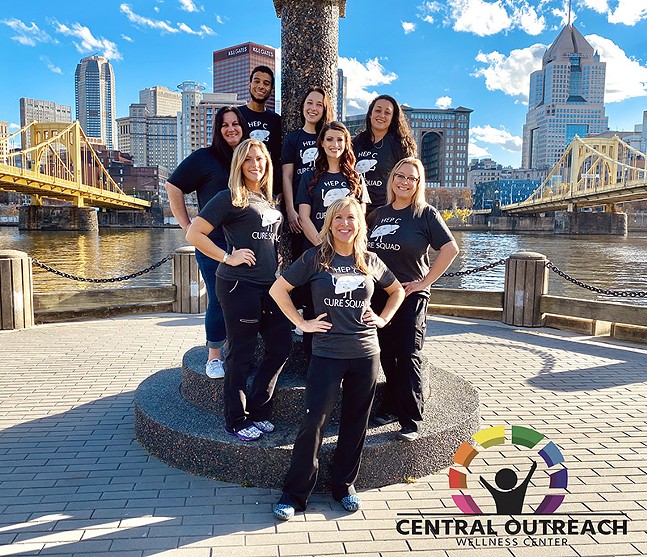But this outreach wouldn’t be possible without a team. Meet Central Outreach’s “Hep C Cure Squad,” the members of the hepatitis C team, starting with Kathi Scholz, Director of the Hepatitis C Outreach for the wellness center and Andrea Stewart, both certified registered nurse practitioners.
This article is one of a two-part series on the Central Outreach Wellness Center hepatitis C team.
What is your role?
Scholz: My name is Kathi Scholz, and I am an Infectious Disease and Addiction Medicine Nurse Practitioner at Central Outreach Wellness Centers. I am the Director of the Hepatitis C Outreach testing and linkage-to-care program based in the addiction recovery communities of Pennsylvania and Ohio.Stewart: I am a nurse practitioner on the Hep C team. It’s a busy department, within Central Outreach Wellness Center. The days are busy as I see patients via telemedicine.
Coming to COWC was a blessing. I had been in acute care (in the operating room) for 15 years.
I took a leap of faith and fell in love with our team, and patients, immediately.
What is your normal day like on the Hep C Cure Squad?
Scholz: A normal day for me is directing our large and multi-faceted outreach program and the activities and schedules of our eight hepatitis C-Cure Squad family. I spend a good portion of my day speaking with new and existing addiction recovery facilities who are integrating our free mobile testing and linkage-to-care program into their space.I also engage with our patients through telemedicine, reviewing lab results, writing prescriptions, and helping our patients navigate the difficult process of getting these life saving medications in their hands. We are also deeply involved in a large hepatitis C study with Penn State, and manage multiple state grant-funding streams.
How did you get involved with this work?
Scholz: I have been a nurse, then a nurse practitioner for many years. Before I joined Central Outreach Wellness Center to develop the hepatitis C mobile testing program, I worked at Allegheny General Hospital in the Gastroenterology (GI) lab.During nurse practitioner school, Dr. Stacy Lane, our founder, invited me to do clinical rotations at her infectious disease clinic on the North Shore. During my rotation at Central Outreach, Dr. Lane introduced me to a better way of practicing medicine — patient centered care. She taught me that each patient has individual needs and concerns, and when you really listen to patients without bias or judgement, it is so rewarding.
During my time with Dr. Lane, a mutual friend called to ask if we would be interested in visiting the suboxone clinic that she directed to test all of the patients for hepatitis C. An idea was born!
How do you do community outreach for those who suffer from hepatitis C?
Scholz: We facilitate community outreach for those that suffer from hepatitis C by meeting people where they are, plain and simple. Our dedication and passion are front and center every day.I think it is very important to offer hepatitis C testing in facilities that a person is already engaging with. Whether that be an addiction medicine clinic, inpatient or outpatient rehabs, drug and alcohol counseling program, halfway or three-quarter houses, transitional housing, homeless shelter, or incarceration facility, we offer education, testing, and linkage-to-care partnerships to any facility that is interested in offering their patients these life changing services.
Stewart: We have a team of medical assistants that go out in the field, and test patients. We get involved with community events such as safety events, and community outreach/education. It is extremely important to go out into the field and reach the patients. There may be many patients who are scared and afraid to come forward. They may already feel ostracized from the community so we go to them and get them help. They are already stigmatized enough. There may also be patients with transportation issues so we make it convenient for easy hep C and STD testing.
Do you organize/rely on community programs/support programs? Or are you mostly responsible for organizing testing sites?
Scholz: I spend much of my time setting up partnerships with providers and directors of addiction recovery facilities, increasing our testing sites, organizing educational and testing programs/events focused on harm reduction, testing, and most importantly, linking these folks to the hepatitis C cure.Why do you think it is important to have available, easy testing for hepatitis C?
Scholz: There are so many barriers to health care today. Lack of awareness of services, availability of services, inadequate or no insurance, high cost, and lack of transportation just to name a few. Additionally, more barriers exist with certain types of "sensitive" conditions associated with fear, stigma, and judgement. The faster, easier, and more culturally sensitive our team can make the testing and linkage-to-care process, the more people are willing to engage.What are some things you have accomplished as a team? What are some of your goals, long-term?
Scholz: We now have over 150 testing site partnerships in 14 Pennsylvania counties and five Ohio counties.We have tested over 8,200 people for hepatitis C and have cured close to 3,000 of these folks! Most importantly, we feel we are saving lives! Hepatitis C is a serious health condition that we call the "silent killer." The longer a person lives with this liver virus, the more scarring is caused in the liver, and eventually this progresses to cirrhosis of the liver. Once this happens the damage of the liver starts to cause major problems. If we can cure everyone with hepatitis C, this serious progression will be avoided.
Stewart: I am a rookie in infectious disease; therefore, I learn something new every day. We have a fantastic team and I am so proud to be a part of it. My goal is continuing support, and education for our patients, and the community as a whole.













